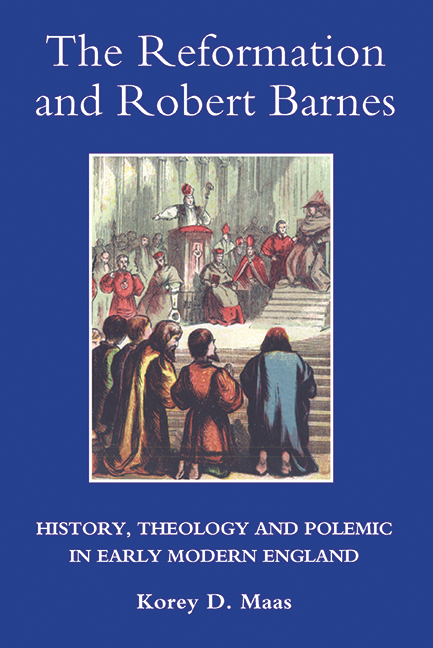Book contents
- Frontmatter
- Contents
- Dedication
- Acknowledgments
- Abbreviations and short titles
- Introduction
- Part I The Life and Theology of Robert Barnes
- 1 The Life of Robert Barnes
- 2 The Theology of Robert Barnes
- Part II Barnes's Programme: History, Theology, and Polemic
- Part III The Reception and Revision of Barnes's Programme
- Bibliography
- Index
- Miscellaneous Endmatter
1 - The Life of Robert Barnes
from Part I - The Life and Theology of Robert Barnes
Published online by Cambridge University Press: 11 May 2017
- Frontmatter
- Contents
- Dedication
- Acknowledgments
- Abbreviations and short titles
- Introduction
- Part I The Life and Theology of Robert Barnes
- 1 The Life of Robert Barnes
- 2 The Theology of Robert Barnes
- Part II Barnes's Programme: History, Theology, and Polemic
- Part III The Reception and Revision of Barnes's Programme
- Bibliography
- Index
- Miscellaneous Endmatter
Summary
Robert Barnes stepped on to the stage of the reformation drama on Christmas Eve 1525; though never one of the most famous players in that drama, he would for the next fifteen years remain very close to the centre of the reformation, both in England and abroad. His patrons at home included the architects of English reform, Thomas Cranmer and Thomas Cromwell, as well as Henry VIII himself, who would for a brief period name Barnes his chaplain and occasional diplomat. His associates on the continent were no less eminent, including not only the Wittenberg theologians Martin Luther and Philip Melanchthon, but also princely protectors of early Lutheranism such as Johann Friedrich of Saxony, Philip of Hesse, and Christian III of Denmark.
As his personal association with such individuals intimates, Barnes travelled frequently – not only as a diplomat, however, but also at times as an exile. This fact, combined with the perennial problems posed by an incomplete documentary record, has resulted in confusing and often conflicting accounts of his life. Indeed, despite his recognised importance, no authoritative biography of Barnes yet exists. Rather shockingly, the most reliable account to date remains that of James Lusardi, which exists only as a brief appendix in the collected works of Barnes's early nemesis Thomas More. Several other substantial biographical surveys were produced earlier in the twentieth century; and while far more objective than the hagiographical accounts noted above in the introduction, these too remain less than authoritative: primarily because they exist only as unpublished theses and therefore remain relatively inaccessible, but also partly for methodological reasons. Most notably, each relied overwhelmingly upon the abstracted versions of primary sources found, for example, in the Letters and Papers, Foreign and Domestic, of the Reign of Henry VIII. Furthermore, the theses forwarded in these dissertations make it evident that none is intended primarily to be a critical biography of Barnes. Charles Anderson, for instance, ‘deals with the general problem of the relationship between the German and early English Reformation’. The same is true of Neelak Tjernagel's Henry VIII and the Lutherans, the revised and expanded version of his own doctoral thesis. Its subtitle, ‘A Study in Anglo-Lutheran Relations from 1521 to 1547’, advertises a trajectory very similar to Anderson's.
- Type
- Chapter
- Information
- The Reformation and Robert BarnesHistory, Theology and Polemic in Early Modern England, pp. 9 - 41Publisher: Boydell & BrewerPrint publication year: 2010

